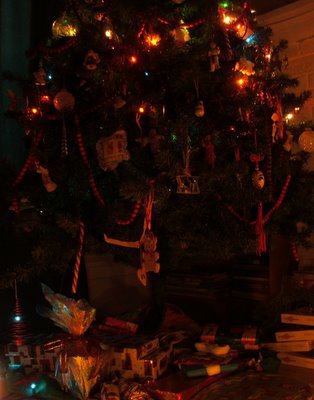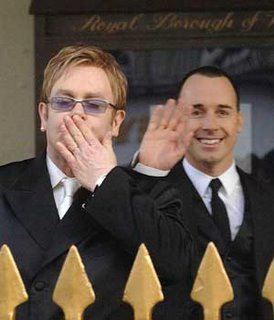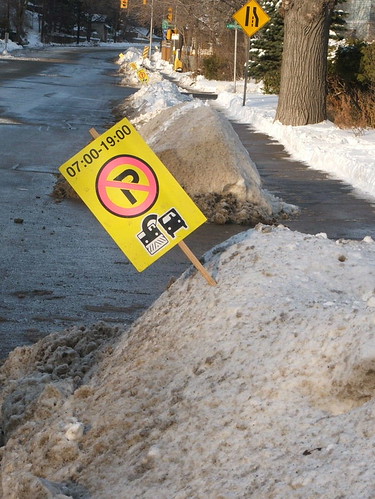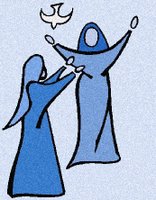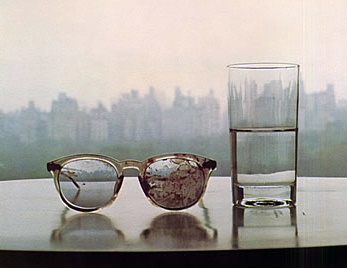Readership is still light, but I feel like I'm overdue to post something. So, in keeping with the relaxed mood of the week between Christmas and New Year's Day, I offer you …
What I did on my Christmas vacation.
I should start by admitting that I
didn't do what I had
planned to do, which was to read a 900-page theology tome by one of my favourite scholars. I know, that isn't
your idea of a vacation activity, but I often read theology to relax. (Even late at night when I'm very tired, which may explain why I have some strange convictions.)
I got distracted by something of lesser significance. For some while, I've wanted to learn how to take music recorded in an analog format (on an audio cassette or vinyl LP) and convert it into digital information. Since my primary Christmas present was an iPod Mini (thank you very much, Mary P.!), I decided it was time to figure this process out.
Remember, I'm from a generation that didn't grow up with computers. In my high school, kids one year behind me had courses in how to use a computer. I missed it by one year … but actually, I didn't miss much. Some of you will find it absolutely incredible, but those kids learned to punch holes in pieces of cardboard: that was how they fed program information into the computers!
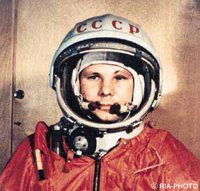
(Go ahead, laugh at the inferior technology. As late as the 1980s, Russian cosmonauts were using that kind of computer, or something only marginally superior to it, to run their space program. They managed to build a space station with that technology. That and lots of duct tape, of course.)
I own Roxio software, and I use it to burn CDs. I was vaguely aware that it could also convert a signal from analog to digital, but I hadn't the foggiest notion how to achieve it. And the stumbling block was something ridiculously simple.
I understood that, somehow, I needed to feed the analog sound into the computer, but I didn't know how to do it. I had read that you must feed the signal directly into the computer's sound card. But I had this vague, unexamined notion that it required a special attachment.
During Christmas vacation, I turned to the fount of all computer wisdom: Mary P.'s sixteen-year-old son, who is extraordinarily knowledgable even by the standards of his generation. He immediately pointed to a little hole in the back of the computer: "You plug the cable in there," he informed me.
Oh.
The harder part was figuring out how to use the "Sound Editor" function in Roxio, because the instructions were utterly useless. I had to resort to a process of trial and error. But
hey! — that's how men prefer to use technology anyway! Instruction manuals are for scrawny little girls, not for powerful grown men. Figuring it out was good for my ego, after the humiliation of not knowing about the "line in" hole in the back of our computer.

Three hours later, Mary P. asked me how the project was coming along. I triumphantly informed her that I had converted
three entire songs from analog to digital — one per hour! This was a major turn on for her, let me assure you. Women find geeks sexy, however much they protest to the contrary.
I spent most of Monday and Tuesday converting even more songs to digital. For example, I had Sting's
Nothing Like the Sun on audio cassette. I had Paul Simon's
Graceland on audio cassette, too. (
Graceland still holds up as an outstanding achievement, by the way; I recommend it very highly.)
Even more fun awaited me: the
Canadian Dedication Suite, performed live by Hugh Fraser and the Vancouver Ensemble of Jazz Improvisation. This is a live recording of a concert I attended this past summer at the Ottawa International Jazz Festival. The Suite was specially commissioned to celebrate the Jazz Festival's 25th anniversary. It was rebroadcast on a local FM station about a week later, and I recorded it. And now — ladies, try to restrain your ardor — I have converted it to a digital file and transferred it to my iPod.
In the best bootleg tradition, I had considered offering you a sample track, but the file is too big to upload to Flickr.com. If you're curious, I can e-mail it to you. (The
Canadian Dedication Suite isn't available on disc.)
It consists of two parts. The first 2:30 consists of the histrionics of the female vocalist. Shades of Yoko Ono / didgeridoo / Janis Joplin. (What?! You've never heard a vocalist mimic a didgeridoo before? Well, then, you haven't really lived, have you?!)
In the second part, the vocalist (I regret that I do not know her name) demonstrates that she can also sing, when VEJI launches into a great blues composition, "The Mother of Us All".
Alas, all good vacations must come to an end. Wednesday I was back at work, although "work" is an exaggeration; not much is happening in the office.
And actually, only the first part of my vacation is over. My kids are off school for another week, and I'll be taking them to visit my parents and two of my two sisters. Christmas Part B, as it were.
But it will be more hectic than the quiet days I enjoyed earlier this week, converting analog data into digital. Ooh, I feel so potent!
~~~~~~~~~~~~~
copyright © 2006, Stephen Peltz
